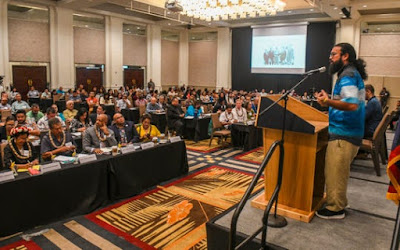|

“Colonialism is a crime against humanity,” said Wilma E. Reverón-Collazo, a human rights attorney from Puerto Rico who participated in the first day of Guam’s decolonization and human rights conference, at the Sheraton Laguna Guam resort.
“Part of the challenge that we face as U.S. territories is to bring the U.S. to the table and make them accept the concept that self-determination cannot be viewed within the narrow confines of the U.S. Constitution,” she said Thursday afternoon.
“We have to be more fearless,” she said, because the United States does not respond if you don’t create a crisis.
Bevacqua: Next step is plebiscite
Gov. Lou Leon Guerrero, chairwoman of the decolonization commission, gave opening remarks, calling on Guam’s current political leadership, which is predominantly female, “to push the issue of self-governance to the forefront.”
Leon Guerrero said Guam needs to learn from the victories and defeats of other colonies in order to make the island’s goal of self-governance a reality.
A federal appeals court in July ruled that Guam’s proposed political status plebiscite, which would have allowed native inhabitants to state their preference for statehood, independence or free association, illegally discriminates based on race, in violation of the Constitution, and cannot be held. Voter registration was restricted to those who met the legal definition of native inhabitant.
Although the federal court struck down the proposed plebiscite, it did not rule against Guam’s pursuit of self-determination, Bevacqua said.
“It doesn’t take away what we should do or what we have to do,” he said. “You want to get to a place where people are proud of their status.”
'Not new'
Bevacqua and fellow UOG professor Carlos Madrid during their panel discussion gave an overview of Guam’s political status under the Spanish, for 333 years, and under the United States, since 1898.
Madrid said Guam’s problems today are the same as the past couple of hundred years — unfulfilled promises of representation. “It has deep roots,” he said.
She said Guam has lost so much it now has no choice but to fight.
"When will enough be enough?" she asked.
Bevacqua said Guam’s push for self-governance and decolonization is not new. It goes back to the moment of colonization and has continued, he said.
Keeping the status quo is not an option, presenter Victoria-Lola Leon Guerrero told attendees, adding Guam belongs to the United States, but is not part of the United States.
The next step is for Guam to hold a plebiscite, said University of Guam professor Michael Bevacqua, who was part of the first conference panel Thursday morning.
___________________
Photo: Michael Bevacqua, a University of Guam assistant professor of CHamoru Studies, addresses those in attendance during the first day of the "Fanhita: Our Continuing Quests for Decolonization” conference at the Sheraton Laguna Guam Resort in Tamuning on Thursday, Sept. 12, 2019. The conference, scheduled to continue on Friday, will include additional local presenters, as well as representitives from Belau and the Virgin Islands. (Photo: Rick Cruz/PDN) |



![]() Oficina Central, C 25 NE 339, San Juan, Puerto Rico 00920.
Oficina Central, C 25 NE 339, San Juan, Puerto Rico 00920. 


















